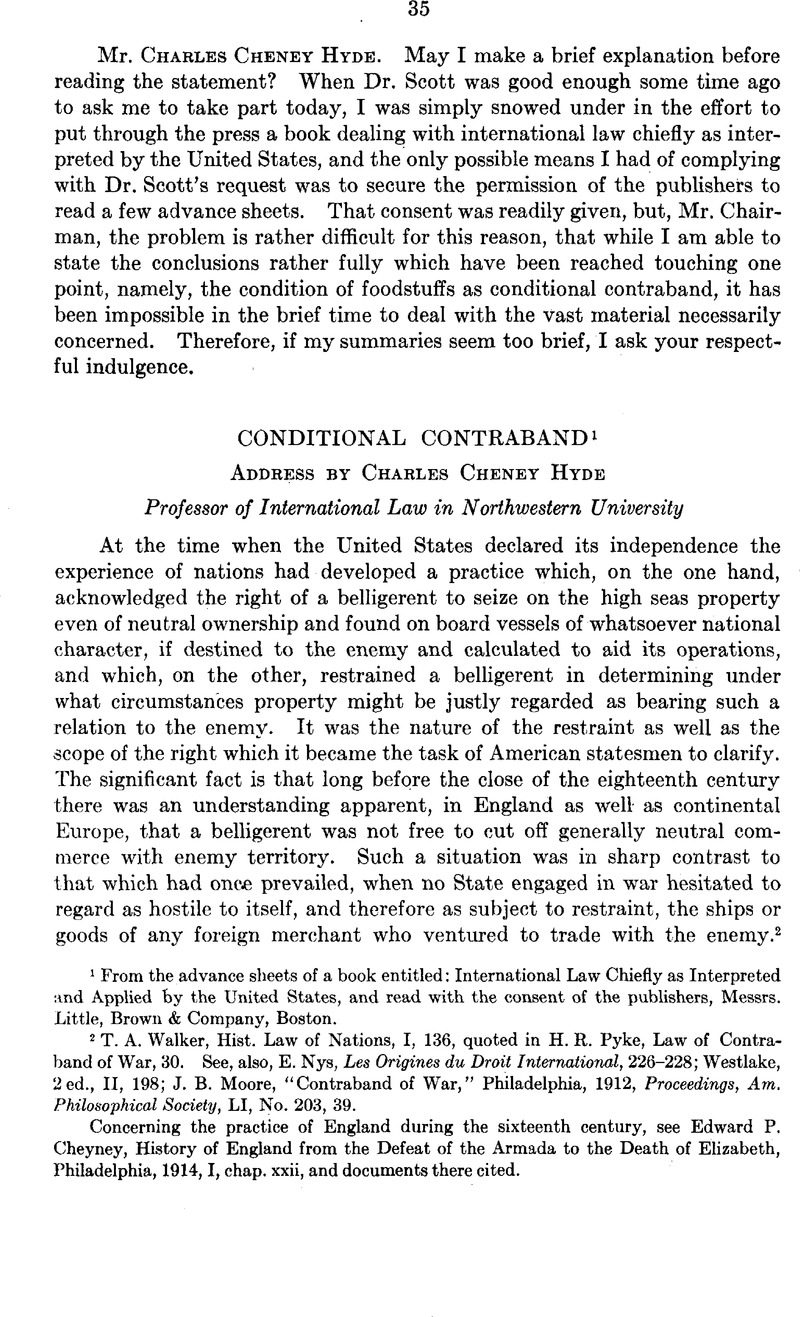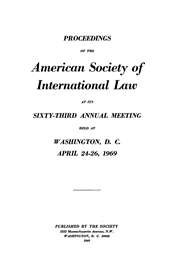No CrossRef data available.
Article contents
Conditional Contraband1
Published online by Cambridge University Press: 27 February 2017
Abstract

- Type
- Second Session
- Information
- Copyright
- Copyright © American Society of International Law 1921
Footnotes
From the advance sheets of a book entitled: International Law Chiefly as Interpreted and Applied by the United States, and read with the consent of the publishers, Messrs. Little, Brown & Company, Boston.
References
2 T. A. Walker, Hist. Law of Nations, I, 136, quoted in H. R. Pyke, Law of Contraband of War, 30. See, also, E. Nys, Les Origines du Droit International, 226-228; Westlake, 2ed., II, 198; J. B. Moore, “Contraband of War,” Philadelphia, 1912, Proceedings, Am. Philosophical Society, LI, No. 203, 39. Concerning the practice of England during the sixteenth century, see Edward P. Cheyney, History of England from the Defeat of the Armada to the Death of Elizabeth, Philadelphia, 1914,1, chap, xxii, and documents there cited.
3 Westlake, 2 ed,,, II, 285.
4 Arts. XII and XIIIJ Les Grands Traités du Règne de Louis XIV, Paris, 1893, 100, 101; Dumont, VI, 266.
5 Art. XI, Brit, and For. State Pap., I, 701, 705.
6 For the text of the Declaration of London see Charles’ Treaties, 268, also Naval War College, Int. Law Topics, 1909, 169.
7 It was declared that this last exception did not apply to a -consignment coming under Art. XXIV (4) of gold and silver in coin or bullion, and paper money.
8 Art. XXXIV.
9 See report by Mr. Renault in behalf of the Drafting Committee with respect to Articles XXXIII-XXXV, Charles’ Treaties, 300-302; also report of the American delegates (Rear Admiral Stockton and Professor Wilson) to the Secy, of State, id., 332, 334, 335. Also instructions of Sir Edward Grey, British Foreign Secy., to Lord Desart, British plenipotentiary at the London Conference, Dec. 1, 1908, Misc. Nov. 4, 1909, International Naval Conference, cd. 4554, 20, 23; J. B. Scott, “The Declaration of London,” Am. Jour. Int. Law, VIII, 274 and 520. 10 Declares Professor Moore: “These grounds of inference are so vague and general at they would seem to justify in almost any case the presumption that the cargo, if bound to any enemy port, was ‘ destined for the use of the armed forces or of a government department of the enemy State.’ Any merchant established in the enemy country, who deals in the things described, will sell them to the Government; and if it becomes public that he does so, it will be ‘well known’ that he supplies them. Again, practically every important port is a ‘fortified place' and yet the existence of fortifications would usually bear no relation whatever to the eventual use of provisions and various other articles mentioned. Nor can it be denied that, in this age of railways, almost any place may serve as a ‘ base’ for supplying the armed forces of the enemy. And of what interest or advantage is it to a belligerent to prevent the enemy from obtaining supplies from a ‘base,’ from a ‘fortified place,’ or from a merchant ‘well known’ to deal with him, in his own country, if he is permitted freely to obtain them from other places and persons, and especially, as countries having land boundaries can for the most part easily do; through a neutral port?” “Contraband of War,“ Philadelphia, 1912, p. 39.
11 Mr. Bryan, Secy, of State, to Mr. W-. H. Page, American Ambassador at London, telegram, Dec. 26, 1914, American White Book, European War, I, 39; Spl. Supp. Am. Jour, Int. Law, IX, 55.
12 Sir Edward Grey, British Foreign Secy., to Mr. W. H. Page, American Ambassador at London, Feb. 10, 1915, id., White Book, 44, 50, 51; Spl. Supp. 65.
13 Compare the reasoning of Mr. Hammond, British Minister to the United States, in his communication to Mr. Jefferson, Secy, of State, Sept. 12, 1793, Am. State Pap., For. Rel. I, 240.
14 Mr. Gerard, American Ambassador at Berlin, to Mr. Bryan, Secy, of State, telegram, Sept. 4, 1914, American White Book, European War, I, 27; Spl. Supp. Am. Jour. Int. Law, IX, 37. It should be observed that while the Senate of the United States had on April 24, 1912, advised and consented to the ratification of the Declaration of London, it was not ratified by the President, and hence never proclaimed. Naval War College, Int. Law Topics, 1915, 93. On Aug. 6, 1914, the United States suggested to the belligerent Powers the advisability of adopting the declaration as a temporary code of naval warfare during the existing conflict. This suggestion was withdrawn Oct. 24, 1914, because of the unwillingness of certain belligerents to accept the declaration without modification. The Department of State simultaneously declared that the Government would insist that the rights and duties of the Government and citizens of the United States in the war be defined by the existing rules of international law and the treaties of the United States “without regard to the provisions of the declaration.” Mr. Lansing, Acting Secy, of State, to Mr. Gerard, American Ambassador at Berlin, telegram, Oct. 24, 1914, American White Book, European War, I, 8; Spl. Supp. Am. Jour. Int. Law, IX, 7. Also correspondence, id., White Book, 5-8; Spl. Supp., 1-7.
15 American White Book, European War, I, 30; Spl. Supp. Am. Jour. Int. Law, IX, 43.
16 Inclosure in report of Mr. Reed, American Vice-Consul at London, to Mr. Lansing) Secy, of State/Apr. 20, 1916, American White Book, European War, III, 109; Spl. Supp- Am. Jour. Int. Law, X, 51.
17 No. 24, p. 15. See, also, Nos. 70, 71 and 72. It is to be noted that the Naval Instructions of June 30, 1917, make no use of the term “conditional contraband.“
18 Declared Sir Edward Grey, British Foreign Secy., to Lord Desart, British plenipotentiary, to the London Naval Conference, Dec. 1, 1908: “It should be borne in mind that what the commerce of the world above all desires is certainty. The object of all rules on this subject should be to insure that a trader anxious to infringe in no way the accepted rights of belligerents, could make sure of not being, unwittingly, engaged in the carriage of contraband, and of thus avoiding the danger of condemnation and loss either of goods or ship, while the trader who deliberately shipped or carried contraband would do so with a knowledge of the risk he ran, and would have no claim to sympathy or compensation if his ship or goods were captured and subsequently condemned by the due process of a prize court.” Correspondence respecting the International Naval Conference, Misc. No. 4 (1909), cd. 4554, 20, 23.
19 See in this connection the views of Professor John Bassett Moore in address before American Philosophical Society, Philadelphia, 1912; and also at St. Louis, in 1915.
20 Food imported into belligerent territory for any class of the population necessarily releases for consumption other food, and so tends to cause each shipload received from abroad to become an indirect source of maintenance of the military and naval forces, even if consumed entirely by persons unattached thereto. Thus the power of substitution accorded the belligerent whose civil population is maintained by imports may prove a vital means of averting the starvation of armies. The United States as a belligerent in 1917 and 1918 applied this principle in limiting exports of foodstuffs to neutral European States in close proximity to Germany. It became important that American exports, although to be consumed by the inhabitants of neutral territories, should not prove to be the means of releasing for export there from to Germany provisions which otherwise could not be spared. The United States demanded, therefore, assurance that neutral States importing American foodstuffs should not thereby become special purveyors to the enemy. See, for example, statement issued by War Trade Broad, in Official Bulletin for May 4, 1918, respecting a general commercial agreement between the United States and Norway, signed by Mr. Vance C. McCormick, chairman of the War Trade Board, and by Dr. Nansen, special representative of the Norwegian Government.




